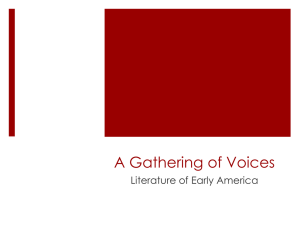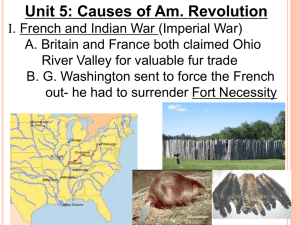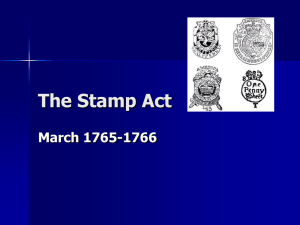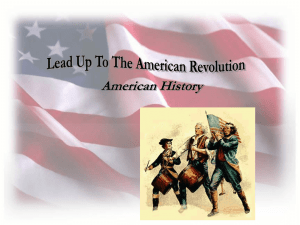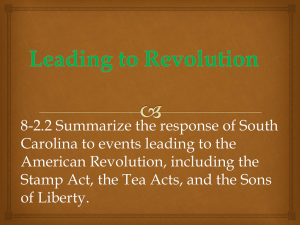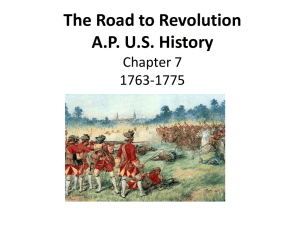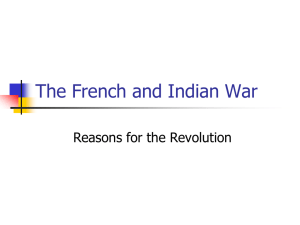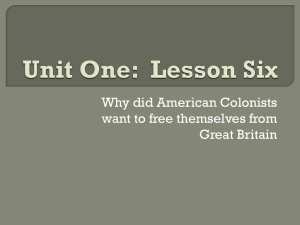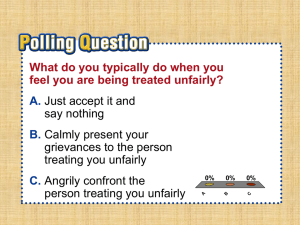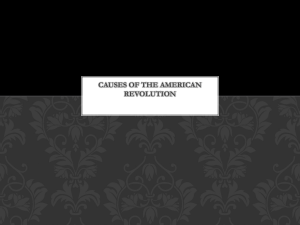Revolutionary America American Pageant Chapters 5-8
advertisement
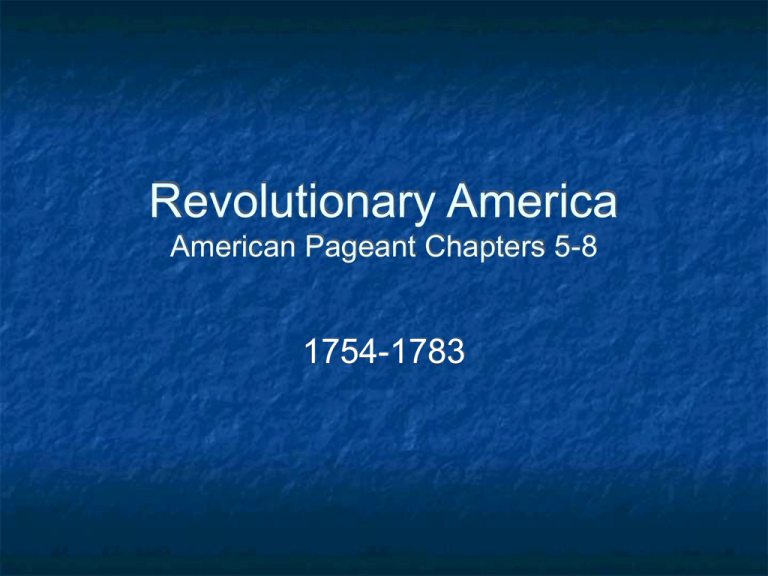
Revolutionary America American Pageant Chapters 5-8 1754-1783 Part I: War for the Empire The French and Indian War The French and Indian War Join or Die: At the height of the problems between the French and the English, the colonies meet in 1754 to attempt a unification of the colonies. Ben Franklin proposed the Albany Plan, which was rejected by the colonists. Great War for the Empire: Washington attempted to work with the French on the Frontier, which led to a breakout of war. The Iroquois Nation: Allied themselves with the British, and the other tribes with French The French and Indian War The War lasted nine years and had very distinct phases that focused the war Phase I -1754-1755 The Tribes: Made alliances and launched a series of raids on English settlements. Braddock and Washington: General Braddock was mortally wounded in an attack on Fort Duquesne in 1755, and Washington is set the forefront of history. The French and Indian War The First Phase left the British at a disadvantage and they needed to do more to win the war Phase II -1756-1757 Global Scale: Fighting took place throughout the British Empire from India to the West Indes. Impressment: The British impressed colonials into the army and also took provisions from the farms, which led to tension among the colonists and the soldiers. William Pitt: Pitt was appointed Prime Minister in 1757. Pitt was instrumental in changing the direction of the war to favor the British The French and Indian War The second phase brought the English in to a good position. Their army was reinforced and they started to win battles. Phase III -1758-1763 Reimburse the Colonists: William Pitt promised to Reimburse the colonists for all their trouble and the impressment. He turned control fo the enlistments over the colonial assemblies. Quebec and Montreal: By 1760, the British had major victories at Quebec and Montreal, which led to their victory in the war. Treaty of Paris 1763: This ended the war. The French had to leave the continent; they could retain area in the West Indies; and the Spanish gave England Florida. The French and Indian War Effects of the war 1. Expanded English territory. 2. Cost of the war enlarged the debt. 3. English leaders thought that the colonists were inept at defending themselves during the war, which led to resentment on both sides. Part II: The Burdens of Empire Taxes, Trade and Independence After the French and Indian War, the English monarchy looked to the colonists to ease the burden of war. A. New Imperialism After the French and Indian War, The English set out to redefine the empire. They needed revenue to get out of the debt they suffered from the war and looked to its colonies for money. King George III: Reasserted his control over the monarchy. Only 22 when he came to throne, his youth added to the problems with the colonies. George Grenville: Prime Minister in 1763. His plan to help the British Empire was at the heart of the tension between the colonies and the crown Proclamation of 1763: an example of the Grenville method. This forbade settlers to move beyond the mountains and occupy the territory. It as a move to keep the colonists safe from the Native Americans, but served as tension between the nations. B. Grenville Program Sugar Act of 1764: Raised the tax on Sugar to deter trade with the French. Mutiny or Quartering Act of 1765: Colonists were told that they had to help with the provisions and quarter of the troops. Currency Act of 1765: Required that assemblies stop issuing paper money. Stamp Act of 1765: Imposed a tax on every printed document: Newspapers, almanacs, pamphlets, deeds, wills, licenses. C. Stamp Act Crisis The Stamp Act was the final straw for the colonists. Colonists united behind the notion that the colonies were not represented. It went against the Salutary Neglect that the British had used in the past. Virginia House of Burgesses: Patrick Henry spoke out against the act and said “If this be treason, make the most of it.” Sons of Liberty: Hanged officials in effigy and pillaged Thomas Hutchinson’s house in Boston. They sponsored a series of boycotts against British goods. Stamp Act Congress: Delegates from nine colonies met to discuss this issue. It was the only time that they agreed Declaration of Rights and Grievances. D. Stamp Act Repealed Non-Importation Agreements: This made official the boycotts that drove the British to repeal the Stamp Act. Merchants were losing too much money, and in response Parliament repealed the act. Declaratory Act: In the process of repealing the act, Parliament made it clear that they had the right to tax the colonies of they deemed it necessary. Charles Townshend: As Prime Minister he came up with another way for the colonists to contribute to the British Monarchy. E. Townshend Program Troops: Townshend forced the colonies to quarter troops. When the assemblies refused to send supplies, he disbanded the assemblies starting with NY in 1767. Duties: Imposed a Tax on various goods: Lead, Paint, Paper and Tea Navigation Acts: He enforced the acts, which led to merchants boycotting all British goods. Townshend died in 1770. Lord North took the tax off everything, except Tea. The troops were still an issue. Early in that year there would be an issue with troops in Boston. Part III: Rebels The tension in the colonies led to issues between the colonists and the troops. A. The Boston Massacre On March 5, 1770 - British soldiers were at the docks. Bostonians started to throw snowballs at them. Thomas Preston: The British Captain lined up troops by a nearby building. First Shots: A soldier fell discharging his weapon, which led to the rest of the troops to fire on the crowd. What really happened on March 5, 1770? This was Paul Revere’s etching. What do you think he was trying to say? Was he effective? It was used by the Sons of Liberty as an example of British Tyranny. B. Philosophy of the Revolt John Locke: The colonists believed that they were protecting the “Natural Rights” guaranteed under the Lockean notion of “Life, Liberty and Property.” No Taxation Without Representation: The colonists wanted to be recognized at Parliament. The British believed in “Virtual Representation” where Ben Franklin was the representative. Historiography: A modern historian, Gordon Wood, argues that the Colonists were radical in their approach, because “…all men created equal.” went against the notion that people were born into wealth and status. America was a place where there was Social Mobility, and that was a revolutionary idea. C. The Issue of Tea Tea Act of 1773: This act worked in conjunction with the Townshend tax. It enhanced it by allowing the East India Tea Company, which was owned by the crown, to directly bring their tea into the colony without being taxed, which hurt local businesses and gave the crown a monopoly on the tea trade. Authority: The tax was not as much the issue as was the authority that the crown asserted over the colonists. December 16, 1773: The Sons of Liberty dressed up as Mohawks and threw the tea into the sea from three ships. Parliament retaliated. D. Parliament Retaliates Coercive Acts: Parliament in the aftermath of the Tea Party 1. Closed the port of Boston; 2. Reduced the power of the local government; 3. Royal officers would be tried in Britain. The colonists called them the Intolerable Acts. First Continental Congress: 12 colonies (No Georgia) met to do the following: Reject a plan to unite under the British; a Moderate statement of grievances; approved military operations to stop any further assault on Boston; agreed to a series of boycotts; and meet the following spring. E. Shot Heard ‘Round the World General Thomas Gage: British General sent out a group to arrest Sam Adams and John Hancock in Lexington, because of their affiliations with the Sons of Liberty. He also wanted to take the munitions from Concord. April 18, 1775 Lexington: Gage sent a detachment to Lexington Green, where the first shots were fired in the war. Concord: The British went to Concord and the munitions were gone. The colonists followed the British back to Boston. The British lost almost three times their men. Second Continental Congress: These acts set the stage for the next congress, where independence was debated.
